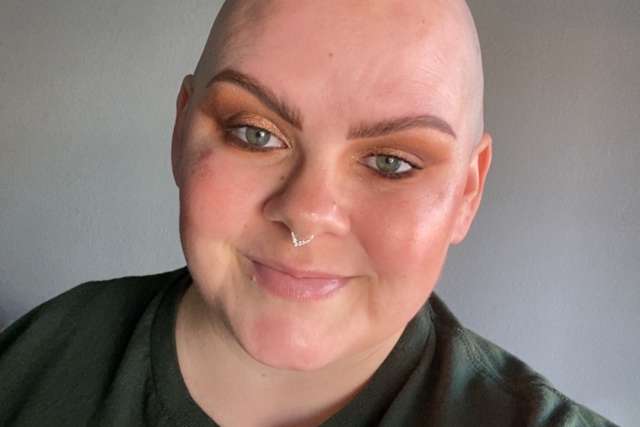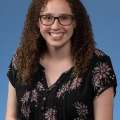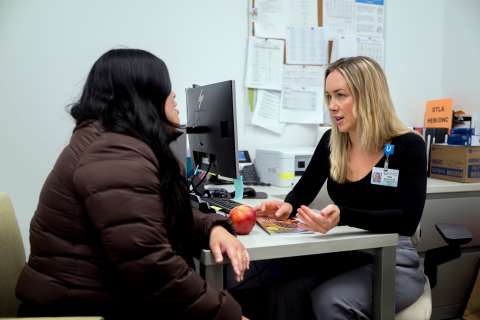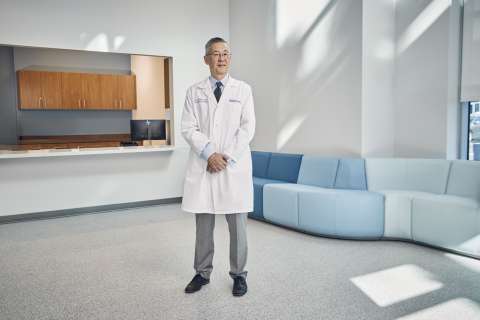Kristin Doss expected to spend her 30s raising her children, advancing her career and enjoying weekend trips with family and friends.
But at 36, she’s undergoing treatment at UCLA Health for a rare, aggressive brain cancer that has reduced her independence and brought difficult conversations with her sons.
“I feel like it’s unfair, honestly,” said Doss, who lives in Ridgecrest in Kern County. “It’s not easy to be young with cancer.”
Support for a younger generation
Doss has relied on social and emotional support from the Adolescent and Young Adult (AYA) program at the Simms/Mann UCLA Center for Integrative Oncology.
Twice a month, she meets for counseling with Carly Nahin, LCSW, who joined the Simms/Mann Center in February 2025 as its first clinical oncology social worker dedicated exclusively to patients age 18 to 39.
Doss also participates in a weekly online support group led by Nahin for young patients in that age group who are grappling with cancer at a time when they would normally be focused on school, jobs and relationships.
Nahin said participants may find themselves the youngest patient in the oncologist’s waiting room, but not in the support group.
“It’s a lot easier to relate to people who are in a similar stage of life to you,” she said. “This is the reason the support group is so beneficial for these patients – it allows them an opportunity to connect with other young people who are also undergoing cancer treatment at UCLA Health.”
According to the National Cancer Institute, an estimated 85,480 adolescents and young adults will be diagnosed with cancer this year in the United States. The 15 to 39 age group accounts for about 4.2% of all cancer diagnoses.
As a young adult herself who has dealt with chronic illness, Nahin said she understands some of the unique challenges for this age group. They may include developing and maintaining relationships, body image, a loss of identity and disruptions to educational and career plans.
“Young adults are in a life stage where they are just discovering themselves. This age group is beginning to build their lives. They are starting their careers, finishing school, navigating relationships and building families,” Nahin said. “Younger people might not have the same financial stability as the older population, since many are just starting to build their financial security.”
Another challenge for young adults can be considering fertility preservation options before beginning treatment.
“It’s forcing people to have conversations that the average 20-year-old doesn’t have to think about,” Nahin said.
Or for patients such as Doss, who already have children at home, they need to take care of themselves and their young families.
“I’m not so much worried about myself – I’m more worried about my kids and how they feel and what they’re going through,” she said.
Treatment followed by recurrence
Doss worked as a judicial courtroom assistant but had to eventually leave her job after her diagnosis with Anaplastic Pleomorphic Xanthoastrocytoma, known as APXA. She also carries a genetic mutation that makes her cancer more aggressive.
She was diagnosed last year after experiencing headaches and what turned out to be seizures.
“I had just got back from a trip to Oregon,” she said. “Things were great. I just had headaches all the time which I just attributed to stress from work.”
Sharing her diagnosis with her sons, who are now 13 and 16, was one of her most difficult moments.
“They cried, of course, and were very worried, which they still are,” she said.
After undergoing surgery to remove the tumor near home, she found UCLA Health’s Albert Lai, MD, PhD, a neurologist and neuro-oncologist and member of the UCLA Health Jonsson Comprehensive Cancer Center.
Doss underwent radiation and chemotherapy at UCLA Health, finishing treatment in January 2025. Six weeks later, a scan found a tiny tumor in another area of her brain.
The recurrence was devastating.
She underwent surgery and then 30 days of radiation that ended in June.
“I thought we were just done,” she said. “I didn’t expect to literally finish chemo and then jump right in to having to do everything again.”
Because of her seizures and the mobility restrictions they have caused, Doss no longer drives and has to ask family and friends for rides.
Her boys are afraid of losing her and ask questions she can’t answer.
“It’s hard being younger and having terminal cancer,” she said. “My son asked me the other day, ‘Are you going to live five years?’ I said, ‘I don’t know how long I have.’ It’s hard to explain that to him and I know he thinks about it constantly.”
Doss lost her hair after undergoing radiation and has experienced other side effects.
“This has affected my memory a lot and my word-finding abilities, just my whole thought process,” she said. “Walking is harder, my right arm gets really tired.”
She has talked to her fiancé about a future they never planned for.
“He has no plans on leaving,” Doss said. “I told him it’s going to get really bad near the end. He’s been very supportive, very sweet, caring and loving.”
Support for cancer – and all of life
Doss said she looks forward to her counseling sessions with Nahin, which are provided at no cost as part of the Simms/Mann Center’s mission to provide holistic care.
“We talk about different things and not always my cancer stuff,” she said. “She’s just been great – her support, her willingness to just listen and offer ideas. At the end of every session she asks, ‘What are you looking forward to this week? What’s another thing you can do to feel better?’”
Nahin said she’s been impressed with Doss’s ability to advocate for herself and her family, as well as her contributions in the support group.
“She’s such a leader,” Nahin said. “She is so good at both providing support and validation to others and also encouraging people in a respectful and supportive way to share their stories.”
Younger people with cancer may have certain strengths that help them navigate their diagnosis, including an openness to receiving online support and a preference for direct communication with their health care providers.
“I need you to tell me all the things now, up front,” Doss said. “I need to know everything.”
Nahin has noticed a tremendous sense of appreciation among the younger patients.
“I find the younger patients just have so much gratitude for each other and appreciation for each individual’s experiences,” she said. “That has been one of the most rewarding things to see. They always thank each other and acknowledge each other’s feelings.”
This fall, Doss expects to find out if her treatment successfully kept her tumor at bay, as well as discuss any next steps with Dr. Lai.
“Now I’m just kind of in limbo land waiting,” she said. “We’re hoping it won’t be there when I have my next appointment.”
No matter what happens next, Doss said she knows she has the support of Nahin and the Adolescent/Young Adult support group.
“To have this set group of people to see and talk to about cancer and life in general is good for me,” Doss said.






